初中英语语法总复习
初级中学英语语法总复习资料题

初级中学英语语法总复习资料题初中英语语法总复习初中英语语法总复习(最后⼀关)第⼀章:名词1.Mum. I’m thirsty. Will you please give me some_________? A.pencilsB.cakeC.waterD.books2.Ann didn’t want to miss the_________of seeing her favorite singer in the concert,so she bought her ticket early. A.bus B.chance C.musicD.meeting3.Are ther any_____________or_____________in the bag?A.tomatos; photosB.tomatoes; photoesC.tomatoes; photosD.tomatos; photoes4.---Forests are very important to us, aren’t they?---Yes. If we have more forests, they will help to keep_________from running away.A.waterB.leavesC.treesD.grass5.There are about twenty___________in the room. They are having a party there.A.peopleB.sheepC.workerD.mens6.Liu Xiang, in his twenties, was once an Olympic winner in the___________hurdles (跨栏).A.110-metreB.110-metresC.110 metreD.110 metres7.John is so kind that he often gives me a_________when I’m in trouble.A.replyB.seatD.reason8.________is spoken the most widely in the world but___________has the largest number of speakers.A.Chines; EnglishB.English; ChineseC.French; RussianD.Russian; German9.Jack bought a_________in a shoe shop yesterday.A.pair of shoesB.pairs of shoesC.pair of two shoesD.pair of shoe10.Bob is looking at the________to find where Beihai Park is. A.picture B.mapC.cardD.blackboard11.There are few___________in the fridge. Let’s go and buy some peas, carrotsand cabbages.A.meatB.fruitC.vegetablesD.bread12.---Why are you walking to school? ----Because my______is broken. A.radioB.watchC.bikeD.bag13.A child asks all kinds of________-while he is growing up. A.troublesB.mattersC.problemsD.questions14.I have three pen friends. One is___________, the other two are________.A.Japanese; AmericaB.Russian; GermanyC.Canada; AustraliaD.English; Frenchmen15.Tom and Linda are_________from Australia. A.students B.girls C.boys16.March 8 is___________Day. A.Woman B.Womans’ C.WomenD.Women’s17.A___________is used for keeping warm. A.stamp B.jacket C.keyD.clock18.The boy hurt one of his__________in the accident yesterday, so he couldn’twalk to school this morning. A.teeth B.feet C.handsD.ears19.What’s wrong with my son’s___________? He can’t see things clearly. A.eyesB.earsC.mouthD.nose20.Some_________are flying kites near the river. A.child B.boy C.boysD.childs21.You may go to the_________if you want to watch Beijing Opera. A.libraryB.supermarketC.theatreD.bookshop22.Look! The________are watering flowers. A.man B.woman C.boyD.children23.Mr White is a businessman. He works in a_________. A.hospital/doc/3d65e70b27c52cc58bd63186bceb19e8b8f6ec2a.html panyC.schoolD.farm24.---Where are you going? ----I’m going to the _______to fly a kite. A.shopB.libraryC.parkD.post office25.---I’ve got an “A”in the exam.---That’s a good_________.You will surely wina second.A.newsB.ideaC.startD.message26.This is Elizabeth Tina Brown, our new teacher. You may call her___________.B.Miss BrownC.Mrs TinaD.Ms Elizabeth27.These are__________________bikes.A.Jim and Sam’sB.Jim’s and SamC.Jim and SamD.Jim’s and Sam’s28.Twelve_____________were hurt, but no ____________were lost in the accident.A.person; lifeB.people; livesC.peoples; livesD.persons; life29.When I asked what had happened, he didn’t say a___________.A.wordB.letterC.messageD.sound30.----Whose dictionaries are these? ----They are the__________.A.twins’B.twinC.twinsD.twin’31.The teacher said we needed to choose three_____________for the school concert.A.farmersB.doctorsC.driversD.singers32. Will you make________________with Tom? A.a friend B.friend C.the friend D.friends33.Henry runs fast. He won the________800-metre race yesterday. A.boys’B.boysC.boyD.boy’s34.Hurry up! There’s little_______________left. A.time B.days35.Do you know my uncle is________?A.a worker and writerB.a worker and a writerC.worker and writerD.worker and a writer36.The old teacher is a friend__________.A.my brother’sB.my brotherC.of my brother’sD.of a brother’s37.Beth has a beautiful_________. Listen! She is singing very well. A.voiceB.lookC.soundD.smell38.My school is about twenty__________walk from here. A.minute B.mintues’C.minute’sD.minutes39.----Jack, would you like something to eat? ----Yes. I’d like some___________.A.breadB.juiceC.orangeD.noodle40.Mrs Jenny gave us___________on how to learn English well.A.some advicesB.many advicesC.some adviceD.an advice41.The whole trip cost____________about three thousand dollars.A.the SmithB.the SmithsC.SmithsD.the Smith’s42.Tom’s handwriting is better than any other______________in his class.C.student’sD.students’43.There are many new books in the library. They are____________books.A.childB.childrens’C.childrenD.children’s44.---Does Lucy like Chinese_________? ----Yes, she does. A.food B.foodsC.any foodD.some food45.When we saw the film Hero, I sat between Ted and Ben. That is to say my seat was between________.A.Ten and BenB.Ted’s and BenC.Ted and Ben’sD.Ted’s and Ben’s46.There is not enough___________in the corner for the fridge. A.placeB.roomC.fieldD.ground47.You can find the following INSTRUCTIONS on___________.A.foodB.moneyC.clothesD.books49.We often watch____________news at 7:00 in the evening./doc/3d65e70b27c52cc58bd63186bceb19e8b8f6ec2a.html AC B.MTVC.BBC/doc/3d65e70b27c52cc58bd63186bceb19e8b8f6ec2a.html TV50.They have searched the____________for 3 hours for the information about the Canon cameras. /doc/3d65e70b27c52cc58bd63186bceb19e8b8f6ec2a.htmlB.radio/doc/3d65e70b27c52cc58bd63186bceb19e8b8f6ec2a.html puter51.Mrs Green is _______mother. A.Mary and Kate B.Mary’s and Kate’sC.Mary’s and KateD.Mary and Kate’s52.----Where’s Mary? ---He’s left a_________ saying that he has something important to do.A.excuseB.messageC.exerciseD.news53.The_________of an air ticket from Dalian to Guangzhuo is about 1,800 yuan.A.priceB.moneyC.pay/doc/3d65e70b27c52cc58bd63186bceb19e8b8f6ec2a.html e54.---Could you read the English_________on the medicine bottle for me? ----OK. Let me try.A.instructionsB.documentsC.picturesD.meanings55.What can I do for you, sir? ----I’d like two_________.A.bottle of milkB.bottles of milksC.bottles of milkD.bottle of milks56.My mother bought ________for me yesterday. A.a pair of glasses B.a pair of glass C.a glasses D.a glass57.Mother is the busiest in my________. She always has a lot of housework to do.A.homeB.houseC.roomD.family58.---It’s dangerous here. We’d better go out quickly. ----But I think we should let________go out first.A.woman and childrenB.women and childC.woman and childD.women and children59.The guide has___________, she will show them to us.A.some old paperB.some special foodC.a new jacketD.some beautiful pictures60.Miss Smith is a friend of__________.A.Mary’s mother’sB.Mary’s motherC.mother’s of MaryD.Mary mother’s61.There is only one ____________doctor and several ___________nurses in this hospital.A.man; womanB.man; womenC.men; womanD.men; women62.I hear we will have a________________holiday in__________.A.two day’s; two day’s timeB.two-day; two day’s timeC.two-day; two days’timeD.two days; two-day time63.----Are there any________on the farm? ----Yes, there are some. A.horseB.sheepC.duckD.chicken64.----What would you like to drink, girls? ----_________, please.A.Two cup of coffeeB.Two cups of coffeeC.Two cups of coffeesD.Two cup of coffees65.Today is September 10th. It’s_________Day while ___________Day is on thesecond Sunday of May. A.Teachers; Mothers B.Teachers’; Mothers’C.Teachers’; Mother’sD.Teacher’s; Mothers’66.This is ____________ bedroom. They like it very much.A.Jane’s and her sisterB.Jane and her sister’sC.Jane’s and her sister’sD.Jane and her sister67.They have much coloured__________.Let’s go and ask for some. A.rulersB.paperC.erasersD.sharpeners68.My mother bought some________for my birthday party yesterday. A.appleB.bananaC.orangeD.meat69.Heilongjiang is in the____________of China. A.northeast B.northeasternC.northwestD.northwestern**70. ______ the end of the street you’ll find the bookstore.A. ToB. ByC. AtD. In71. John is quite clever ________ painting.A. byB. atC. toD. with72. I’m going to bed ______ midnight.A. inB. atC. onD. by73. His parents died when he was ________ the age of three.A. inB. atC. byD. on74. The child threw a stone _______ the dog.A. atB. forC. onD. onto75.China was _______ war _______ Japan at the time.A. on; withB. at; withC. on; againstD. in; against76.The car is running _______ 50 miles an hour.A. inB. withC. byD. at77. The old man was disappointed ________ her refusal.A. atB. withC. byD. to78. The Germans drove forward ______ a speed of 50 km an hour and they broke through the Englishdefence lines _______ great speed.A. at; withB. with; byC. by; atD. at; by79. She came here ______ Charlie’s car, not ________ sea.A. by; byB. in; onC. in; byD. in; at80. You should write _______ pencil, that is, _______ a pencil.A. in; withB. with; withC. in; inD. with; in81. Can you do the experiment _______ another day.A. byB. inC. onD. with第⼆章:冠词与数词1.________earth we live on is bigger than __________moon. A.The; a B.The; theC.An; aD.An; the2.There’s__________ “h”in the word “hair”and__________ “h”is the first letter of the word.A.a; theB.a; anC.an; theD.a; a3.We can see the sun in __________ daytime, but we can’t see it at ________night.A.a; theB.the; /C.a; /D.an; /4.I am reading___________novel, _______is ________interesting story.A.a; that; anB.the; which; theC.a; which; anD.the; which; the5.My uncle is_______old man, and he likes playing________chess. A.a;aB.an;anC.the; theD.an; /6.---Are you_________Chinese or Japanese? ----Chinese. But I was born in Japan.A.anB./7.----It looks like rain. Why not take_________ umbrella with you? ----Thank you. But I don’t think it’s necessary.A.aB.anC./D.several8.David has_________cat. It’s very nice. A.a B.an C.the D./9.The boys and girls often play________football in_______afternoon. A./; anB.the; anC./;theD.a; the10.He himself is very rich. However, he often says___________rich should help__________poor.A.the; aB.a; theC.the; theD./; /11.Jim is now making____________kite. He’s going to fly__________ kite after lunch.A.a; aB.a; theC.the; theD.the; a12.She is one of ___________most popular teachers in this school. A.a B.theC./D.much13.Mr Black didn’t go to work yesterday because he was ill in_______bed. A.aB.anC.theD./14._____________Greens are on___________visit to a beautiful city in China.A./; aB.A; theC.The; aD.The; /15.----I quite like songs sung by Zhou Jielun. ----Yeah, he is really___________unusual singer, you know.16.I studied________English in_________England and I like ________English language very much.A.the; the; theB.an; an; anC./; /; /D./; /; the17.They go to school by_________bus but sometimes there aren’t any seats on _________bus.A.the; theB.a; aC./; /D./; the18.There is_____________8-metre-long bridge over the river. A.a B.anC.theD./19.I have no classes on __________Sundays. A.a B.an C.the D./20.My mother takes __________walk after supper every day. A.an B.theC./D.a21.English is___________language. It is_________important tool. A.a; a B.a; anC.the; anD.a; /22.February is ________second month of the year. A.the B.a C.anD./23.She has made __________decision that she will be __________inventor some time.A.a; theB.a; anC.the; anD.the; the24.They had_______good time in the party, which is__________success. A.a; aB./;/C.a; /D./; aC./D.the27.---What about __________story you read last night? ----It’s terrific, I think.A.aB.anC.theD.one28.---What’s on the screen? ----Is there________ ad for a new film? A.aB.anC.theD./29.----What’s in _________glass on the table? ----Some milk, A.a B.anC.theD./30.She is ________good doctor that everyone wants to see her. A.such a B.a such C.a very D.so a31.September the _________is Teachers’Day. Let’s make some cards for our teachers. A.ten B.tenth C.nine D.ninth32.----Which is the smallest number of the four? ----__________.A.Two-thirdsB.A halfC.A quarterD.Three-fourths33.__________of the teachers in our school are women teachers.A.Three quarterB.Two thirdsC.Second threeD.Three four34.Tim is ________________-boy. He can say a few words.A.an one-year oldB.a one-year-oldC.an one-year oldD.a one-year oldD.sixteen36.I was born__________. A.in Oct 8, 1969 B.in 1969, Oct, 8 C.on Oct 8, 1969 D.on 1969, Oct 837.He cut the cake_________. A.in halves B.in half C.into halvesD.into half38.---It’s 9:45. ----Yes, it’s__________.A.fifteen from tenB.a quarter to tenC.fifteen past nineD.a quarter past ten39.You can see ___________if you go out at night./doc/3d65e70b27c52cc58bd63186bceb19e8b8f6ec2a.html lion starsB.thousand of starsC.hundred stars/doc/3d65e70b27c52cc58bd63186bceb19e8b8f6ec2a.html lions of stars40.When Mr Liu was_________, he became a famous professor.A.on his fortiesB.in his fortiesC.in the fortyD.in the forties41.December is___________month of the year. A.twelve B.the twelfthC.the twelveD.twelfth42.He was born__________.A.in 984, October 27B.in October 27, 1984C.on 27, 1984 OctoberD.on October 27, 198443.Tomorrow we are going to learn__________.A.Lesson SecondB.the Lesson TwoC.Lesson TwoD.second lesson44.Mr Smith lives on __________floor. A.fiveth B.fifth C.the fivethA.two-hundred-wordB.two-hundreds-wordC.two-hundreds-wordsD.two-hundred-words46.Eighty-nine plus_______is one hundred. A.zero B.nine C.elevenD.fifteen47.It took________men________years to build the Great Wall.A.hundred; millionB.two millions of; hundreds ofC.two million; hundred/doc/3d65e70b27c52cc58bd63186bceb19e8b8f6ec2a.html lions of; hundreds of48.The boy has ___________stamps.A.two hundreds and fifty-fiveB.two hundreds fifty-fiveC.two hundred and fifty-fiveD.two hundred fifty-five49.The film star is going to spend ____________dollars on a new dress for the coming party.A.three thousandsB.thousands ofC.thousand ofD.three thousands of50.----Do you often read China Daily for__________before supper.A.half an hourB.half a hourC.half hourD.an hour half51.They have got only one pencil. They need__________pencils.A.more sixB.six moreC.six anotherD.other six52.----Can you write the number eighty-five thousand, six hundred and twenty-six? ----Yes, it is________.A.856620D.5862653.----If a=3, b=4, what’s the answer to the problem, a+ 2ab + 1= ? The answer is___________.A.twenty-eightB.twenty-eighthC.thirteenD.eighteenth54.----What’s the time, Dad? ----Let me see. It’s__________.A.June 1stB.SaturdayC.seven o’clockD.Children’s Day55.Twenty percent of the students ________from the south while 80 % of the rich land _______in the north. /doc/3d65e70b27c52cc58bd63186bceb19e8b8f6ec2a.html e; isB.is; is/doc/3d65e70b27c52cc58bd63186bceb19e8b8f6ec2a.html es; isD.are; are56.About____________of the books in our school are written in Chinese.A.four-fiftyB.four-fifthsC.fourth-fifthsD.fourths-fifth57.Both of the two rulers are broken. I want to buy a________one. A.threeB.thirdC.forthD.fourth58.They have learned English for__________.A.two years and a halfB.two and a half yearsC.two half yearsD.both A and B59.Next Sunday is my brother’s ___________birthday. A.twenty B.twentiethC.twentithD.the twentiethB.two-days-timeC.two day’s timeD.two days time61.He stepped into the office,_________down and began to fill in the forms.A.sittingB.to sitC.satD.having it62.She said she would telephone but we __________from her so far.A.haven’t heardB.didn’t hearC.hadn’t heardD.won’t hear63.When I got to the cinema,the film____________for ten minutes. A.has begunB.had begunC.had been onD.was64.I’ll go with you as soon as I__________my homework. A.will finishB.finishC.am finishingD.finished65.If it__________tomorrow,I won’t go to the cinema. A.will rain B.rainsC.is rainingD.rained66.----Have you got some water to drink? ----Here you are. There________ still some in the bottle.A. areB. wereC. isD. was67. ________ there many American friends in the school last Friday? A. Is B. Was C. Are D. Were 68. There ________ great many accidents last year. A. were a B. are a C. is a D. was69. In 1850, about a third of U. S. A_____________covered by forests. A. were B. has been C. / D. was70.Most of our earth___________ covered by water. A. are B. is C. was D. were71. Neither_____________right. A. answers are B. answers aren't C. answer is D. answer isn'tC. is; growingD. is; grown73. The police often____________the children across the street.A. helpB. helpsC. helpingD. is helping74.__________ going to England by air next week.A. The Green family areB. The Greens family areC. The Green's family areD. Green family are75. The whole family __________ enjoying the beautiful music now.A. is allB. all isC. all areD. are all76.Our class ___________ big. A. is B. are C. were D. will77. Neither he nor I ___________ from Canada. We are from Australia. A. is B. are C. am D. be78. Either you or he ____________ right. A. are B. is C. does D. were79. Neither Mary nor her brother____________ good at singing. A. is B. areC. is notD. are not80.Not only Tom but also Alice and Mary _________ busy. A. is B. wasC. areD. has81. Physics ___________ interesting to us. A. are B. has C. is D. were82.The news___________ exciting. We got excited at it. A. is B. was C. were D. are83. Though mathematics______________ hard, we all work at it hard. A. are B. were C. was D. is84. Ms Wang didn’t mind at all ____________ to the ceremony.A. being not invitedB. not being invited1.----Is this dictionary_________or__________? ----It’s mine.A.your; hersB.yours; herC.your; herD.yours; hers2.Can I borrow________pencil? __________is broken.A.you; MyB.your; MeC.your; MineD.yours; My3.---Wow! What a nice computer. ----My parents bought it for my sister and me. It’s_________.A.oursB.hersC.mineD.theirs4.Mary, please show______________your picture. A.my B.mine C.ID.me5.----Who taught you to play basketball? ----Nobody, I learnt it by____________.A.myselfB.meC.mineD.me6.The weather in Guangzhou is hotter than__________in Beijing. A.it B.thatC.oneD.those7.This is my dog, that that is__________. A.he B.him C.hisD.himself8.Oh, there is someone in the room.________must be my brother. A.ThereB.SheC.ThisD.It9._______schoolbag is much better than________. A.Her; me B.Hers; my。
初中英语语法总复习:形容词比较级最高级

“The+比较级…,the+比较级…”
The smaller the house is, the less it will cost us the heat.
表示不及另一方时,使用“less+原级 +than…”
This park is less beautiful than that one.
…one of the+最高级+名词复数 Lu Xun is one of the greatest writers last century. …最高级+of (in/among)…
B
A. we like it less B. the less we liked it
C. better we liked it D. it looked better
( B)4 Don’t worry. Your baby is looked after ____
here, the nurse are very ____.
ห้องสมุดไป่ตู้
倍数词/half+as+形容词原形+as
Tom is three times as old as Mike.
My school is twice/half as large as Yours.
比较级+than…
Our school is larger than theirs. This bridge is longer than that one.
精编初中英语中考总复习语法知识总结归纳大全

初中英语语法大全一.词类(Parts of Speech)名词英文名称The Noun(缩写为n.) 表示人或事物的名称,例词:job 工作He's trying to get a job.他正在找工作。
table 桌子I'd like a table for two at about 8:30, please.我想订一张8:30左右的双人桌。
phone 电话I have to make a phone call.我得打个电话。
car 汽车Where can I park the car?我可以在哪里停车呀?cat 猫Your cat isn't very friendly.你的猫不太友好。
冠词英文名称The Article(缩写为art.) 用在名词前帮助说明名词所指的人和或事物,例词:a(an)There's a visitor for you.有位客人找你。
theThe phone rang.电话铃响了。
代词英文名称The Pronoun(缩写为pron) 用来代替名词、形容词或是数词,例词:I 我we 我们you 你,你们he 他she 她it 它that 那this 这what 什么形容词英文名称The Adjective(缩写为adj.) 用以修饰名词,表示人或事物的特征,例词:new 新的This idea isn't new.这主意不新鲜。
fast 快的That clock's an hour fast.那个钟快了一个小时。
white 白色的He had nice square white teeth.他的牙齿洁白而整齐,十分好看。
red 红色的She was red with shame.她羞愧地红了脸。
fine 美好的There is a fine view of the countryside.这里可以看到乡村的美景。
good 好的The results were pretty good.结果相当不错。
【英语知识点】初中英语语法总复习重点总结
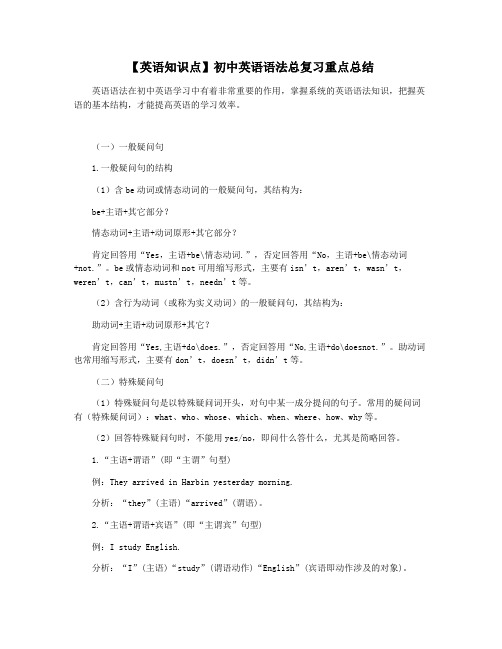
【英语知识点】初中英语语法总复习重点总结英语语法在初中英语学习中有着非常重要的作用,掌握系统的英语语法知识,把握英语的基本结构,才能提高英语的学习效率。
(一)一般疑问句1.一般疑问句的结构(1)含be动词或情态动词的一般疑问句,其结构为:be+主语+其它部分?情态动词+主语+动词原形+其它部分?肯定回答用“Yes,主语+be\情态动词.”,否定回答用“No,主语+be\情态动词+not.”。
be或情态动词和not可用缩写形式,主要有isn’t,aren’t,wasn’t,weren’t,can’t,mustn’t,needn’t等。
(2)含行为动词(或称为实义动词)的一般疑问句,其结构为:助动词+主语+动词原形+其它?肯定回答用“Yes,主语+do\does.”,否定回答用“No,主语+do\doesnot.”。
助动词也常用缩写形式,主要有don’t,does n’t,didn’t等。
(二)特殊疑问句(1)特殊疑问句是以特殊疑问词开头,对句中某一成分提问的句子。
常用的疑问词有(特殊疑问词):what、who、whose、which、when、where、how、why等。
(2)回答特殊疑问句时,不能用yes/no,即问什么答什么,尤其是简略回答。
1.“主语+谓语”(即“主谓”句型)例:They arrived in Harbin yesterday morning.分析:“they”(主语)“arrived”(谓语)。
2.“主语+谓语+宾语”(即“主谓宾”句型)例:I study English.分析:“I”(主语)“study”(谓语动作)“English”(宾语即动作涉及的对象)。
3.“主语+谓语+间接宾语+直接宾语”(即“主谓双宾”句型)例:Our teacher taught us English.分析:“our teacher”(主语)“教”(谓语动作)“us”(间接宾语)“English”(直接宾语)。
初中英语语法汇总

初中英语语法汇总(一)、及物动词与不及物动词英语中按动词后可否直接跟宾语,可把动词分成及物动词与和及物动词。
1.及物动词:字典里词后标有vt. 的就是及物动词。
及物动词后必须跟有动作的对象(即宾语),可直接跟宾语。
see 看见(vt.) +宾语I can see a boy.2.不及物动词:字典里词后标有vi. 的就是不及物动词。
不及物动词后不能直接跟有动作的对象(即宾语)。
若要跟宾语,必须先在其后添加上某个介词,如to,of ,at后方可跟上宾语。
具体每个动词后究竟加什么介词就得背动词短语了,如listen to,look at…..3. 宾语(动作的对象):是名词或代词,或相当于名词的词或短语(如动名词)。
其它词不看作动作的对象呢。
4.举例:“看”(1)see 看见(vt.) +宾语I can see a boy.(2)look 看(vi.) x宾语(即不能直接加宾语). Look! She is singing.Look carefully! (注意:carefully 是副词,不是名词,故不作宾语哟)(3)look at 看…….+宾语Look at me carefully! (me是代词,作宾语了)(二)、什么是反意疑问句前面是肯定,后面就否定前面是否定,后面就肯定eg:1.It is a find day,isn't it?2.It isn't a find day,is it?前面是肯定,后面就否定前面是否定,后面就肯定eg:1.It is a find day,isn't it?2.It isn't a find day,is it?(三)初中英语八种时态归纳复习l 时态是英语学习中一个至关重要的内容,广大初中学生在实际运用时,往往对时态总是倍感棘手,下面我们就归纳复习一下这几种时态。
一、一般现在时:l 概念:经常、反复发生的动作或行为及现在的某种状况。
初中英语语法总复习-名词

第一章名词名词-———--- 表示人、事物、时间、地点、现象或者抽象概念的名称.可数名词的单数规则变化可数名词的复数不规则变化复合名词的复数变化名词的数集体名词的数常见的不可数名词不可数名词的数不可数名词的数量表达方式专有名词的数名词‘s所有格名词所有格of 所有格双重所有格名词在句中的作用名词的修饰语一、名词的数1。
可数名词的单数:可数名词的单数形式前面一般加冠词a或an,表示“一”的概念.2。
可数名词的复数可数名词的复数构成形式有两种:一种为规则变化,另一种则为不规则变化(其变化形式需要特别记忆)。
(1)规则变化:一般是在名词后加—s或者—es构成,有规律可循。
(2)不规则变化①元音字母发生变化:man —men 男人;woman - women 女人; foot - feet 脚;tooth —teeth 牙齿②词尾发生变化:child —children 孩子;mouse —mice 老鼠③单、复数形式相同:deer 鹿;fish 鱼;sheep 绵羊;Chinese 中国人;Japanese日本人考点提示:单、复数形式相同的名词在使用时,要注意其谓语动词的变化形式:All Chinese are proud of it. 所有中国人都为此感到骄傲.A Japanese is among the visitors. 游客中间有一位是日本人。
④某些集合名词的单数形式具有复数意义:people 人们;police 警察;public 公众⑤有些以—s结尾的名词通常被看做单数形式:physics物理;politics 政治;news新闻⑥有些名词通常只有复数形式:clothes 衣服;trousers裤子;glasses 眼镜(3)复合名词的复数变化①一般情况下只变词尾:classroom —classrooms 教室;highway —highways公路;bookshelf —bookshelves 书架②把中心名词复数:passer—by —passers—by 过路人;looker—on —lookers—on 旁观者③没有中心词,则在最后部分变化:grown—up —grown—ups 成年人考点提示:○German - Germans 德国人human —humans 人类○man或者woman 修饰另一名词时,man 或woman与被修饰的名词都要变为复数:a man doctor —men doctors 男医生;a woman teacher - women teachers 女教师3。
初中英语语法大全总复习

初中英语语法大全总复习英语语法大全初中英语语法学习提纲一、词类、句子成分和构词法:1、词类:英语词类分十种:名词、形容词、代词、数词、冠词、动词、副词、介词、连词、感叹词。
1、名词(n.):表示人、事物、地点或抽象概念的名称。
如:boy, morning, bag, ball, class, orange.2、代词(pron.):主要用来代替名词。
如:who, she, you, it .3、形容词(adj..):表示人或事物的性质或特征。
如:good, right, white, orange .4、数词(num.):表示数目或事物的顺序。
如:one, two, three, first, second, third, fourth.5、动词(v.):表示动作或状态。
如:am, is,are,have,see .6、副词(adv.):修饰动词、形容词或其他副词,说明时间、地点、程度等。
如:now, very, here, often, quietly, slowly.7、冠词(art..):用在名词前,帮助说明名词。
如:a, an, the.8、介词(prep.):表示它后面的名词或代词与其他句子成分的关系。
如in, on, from, above, behind.9、连词(conj.):用来连接词、短语或句子。
如and, but, before .10、感叹词(interj..)表示喜、怒、哀、乐等感情。
如:oh, well, hi, hello.2、句子成分:英语句子成分分为七种:主语、谓语、宾语、定语、状语、表语、宾语补足语。
1、主语是句子所要说的人或事物,回答是“谁”或者“什么”。
通常用名词或代词担任。
如:I’m Miss Green.(我是格林小姐)2、谓语动词说明主语的动作或状态,回答“做(什么)”。
主要由动词担任。
如:Jack cleans the room every day. (杰克每天打扫房间)3、表语在系动词之后,说明主语的身份或特征,回答是“什么”或者“怎么样”。
初中英语语法总复习谓语动词

mind, miss, enjoy, imagine, practise, suggest, finish, escape, excuse, appreciate, admit, prevent, keep, dislike, avoid, risk, resist, consider
can’t help, feel like, succeed in, be fond of, object to, get down to, be engaged in, insist on, think of, be proud of, take pride in, set about, be afraid of, be tired of, look forward to, devote oneself to, be worth, be busy, pay attention to, stick to
2020中考英语英语语法总复习英语语法大全之非谓语动词
I.
非谓语动词的分类、意义及构成:
非谓语形式
构成
特征和作用
时态和语态
否定式
复合结构
不定式
to do
to be doing
to have done
to be done
to have been done
在非谓语前加not
for sb. to do sth.
stop doing停止正在做的事
意义不同
remember/forget/regret to do(指动作尚未发生)
remember/forget/regret doing(指动作已经发生)
go on to do(接着做另外一件事)
go on doing(接着做同一件事)
初中英语语法及要点总结复习资料
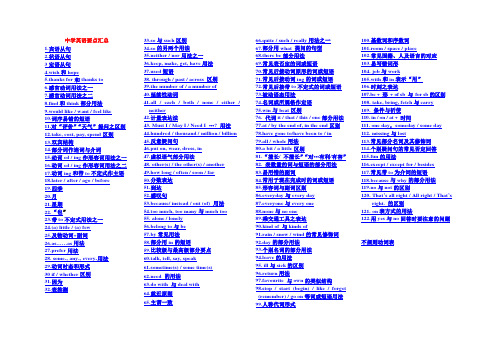
中学英语要点汇总1.宾语从句2.状语从句3定语从句4.wish和hope5.thanks for和thanks to6.感官动词用法之一7.感官动词用法之二8.find和think部分用法9.would like / want / feel like10.词序易错的短语11.对“评价”“天气”提问之区别12.take, cost, pay, spend区别13.双宾结构14.部分词作连词与介词15.动词ed / ing作形容词用法之一16.动词ed / ing作形容词用法之二17.动词ing和带to不定式作主语ter / after / ago / before19.四季20.月21.星期22.“也”23.带to不定式用法之一24.(a) little / (a) few25.及物动词+副词26.as……as用法27.prefer用法28. some-, any-, every-用法29.动词时态和形式30.if / whether区别31.因为32.表推测33.so与such区别34.so的另两个用法35.neither / nor用法之一36.keep, make, get, have用法ed短语38. through / past / across 区别39.the number of / a number of40.延续性动词41.all / each / both / none / either /neither42.计量表达法43.Must I / May I / Need I …? 用法44.hundred / thousand / million / billion45.反意疑问句46.put on, wear, dress, in47.虚拟语气部分用法48. other(s) / the other(s) / another49.how long / often / soon / far50.分数表达51.到达52.感叹句53.because/ instead / out (of) 用法54.too much, too many与much too55. alone / lonely56.belong to与be57.by常见用法58.部分用in的短语59.比较级与最高级部分要点60.talk, tell, say, speak61.sometime(s) / some time(s)62.need 的用法63.do with 与deal with64.就近原则65.主谓一致66.quite / such / really用法之一67.部分用what 提问的句型68.there be部分用法69.常见表否定的词或短语70.常见后接动词原形的词或短语71.常见后接动词ing的词或短语72.常见后接带to不定式的词或短语73.被动语态用法74.名词或所属格作定语75.win与beat区别76. 代词it / that / this / one部分用法77.at / by the end of, in the end区别78.have gone to/have been to / in79.all / whole用法80.a bit / a little区别81.“擅长/ 不擅长”“对…有利/有害”82.表数量的词与短语的部分用法83.易用错的副词84.常用于现在完成时的词或短语85.形容词与副词区别86.everyday与every day87.everyone与every one88.none与no one89.乘交通工具之表达90.kind of 与kinds of91.rain / snow / wind的常见修饰词92.day的部分用法93.个别名词的部分用法94.leave的用法95.ill与sick的区别96.return用法97.favourite 与own的类似结构98.stop / start (begin) / like / forget(remember) / go on等词或短语用法99.人称代词形式100.基数词和序数词101.room / space / place102.常见国籍、人及语言的对应103.易写错词形104. job与work105.with和in表示“用”106.时刻之表达107.be + 形+ of sb 与for sb的区别108. take, bring, fetch与carry109. 条件与祈使110. in / on / at + 时间111. one day,someday / some day112. missing与lost113.常见部分名词及其修饰词114.个别疑问句的常见否定回答115.fun的用法116.except / except for / besides117.常见带to为介词的短语118.because与why的部分用法119.no与not的区别120. That’s all right / All right / That’sright. 的区别121. on表方式的用法122.用yes与no回答时要注意的问题不规则动词表中学英语要点汇总1.宾语从句:怎样判断出一个从句是宾语从句?○1在动词后作宾语(动宾):Do you know where he comes from? 划线部分是动词know的宾语.○2.在有些接双宾结构的动词后作宾语:He asked me when we would leave. 此句中me与从句when-分别是ask的宾语。
2023年中考英语总复习初中英语语法知识十三大专题复习讲义及习题(精编版)
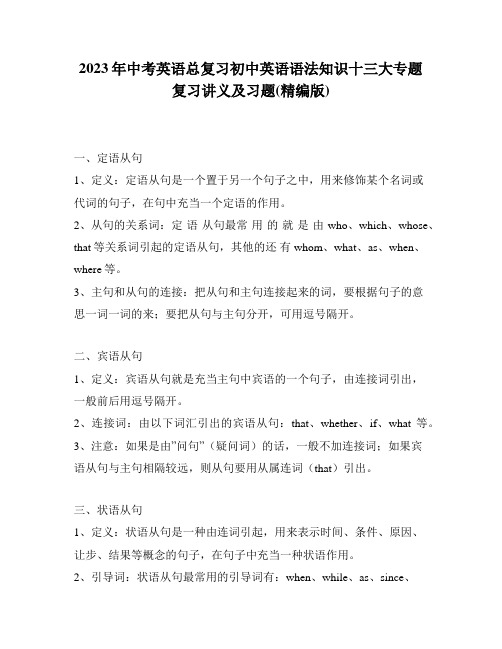
2023年中考英语总复习初中英语语法知识十三大专题复习讲义及习题(精编版)一、定语从句1、定义:定语从句是一个置于另一个句子之中,用来修饰某个名词或代词的句子,在句中充当一个定语的作用。
2、从句的关系词:定语从句最常用的就是由 who、which、whose、that等关系词引起的定语从句,其他的还有 whom、what、as、when、where等。
3、主句和从句的连接:把从句和主句连接起来的词,要根据句子的意思一词一词的来;要把从句与主句分开,可用逗号隔开。
二、宾语从句1、定义:宾语从句就是充当主句中宾语的一个句子,由连接词引出,一般前后用逗号隔开。
2、连接词:由以下词汇引出的宾语从句:that、whether、if、what等。
3、注意:如果是由”问句”(疑问词)的话,一般不加连接词;如果宾语从句与主句相隔较远,则从句要用从属连词(that)引出。
三、状语从句1、定义:状语从句是一种由连词引起,用来表示时间、条件、原因、让步、结果等概念的句子,在句子中充当一种状语作用。
2、引导词:状语从句最常用的引导词有:when、while、as、since、until、before、after、if、whether、because等。
3、务必注意:时间、地点、条件状语从句切忌混淆,要分清才可正确运用。
四、名词性从句1、定义:名词性从句又称为词性的从句,是一个句子充当主句中的一个名词,它可单独作句子的主语,宾语或表语。
2、从句的连接词:要表达名词性从句的概念,最常采用的就是由关系代词(who, whom, which, that等)、关系副词(when, where, why, how 等)以及由从属连词(if, whether等)引起的名词性从句。
3、注意事项:将其从名词性从句区分开来可用逗号隔开;也要注意主句和从句之间的位置关系,情况不同,连接词可以不同。
五、简单句1、定义:简单句也叫单个句子,是由一个主语和一个谓语动词构成的一句话;当主语是第一人称或三单时,句尾不加to。
初中英语语法总复习

初中英语语法总复习一、时态:一般现在时定义:经常、反复发生的动作或行为及现在的某种状况。
动词用原形 ( 单三人称动词加s/es)( 问句和否定句借用助词do/does)一般过去时定义:过去某个时间里发生的动作或状态;过去习惯性、经常性的动作、行为。
动词用过去式( 问句和否定句借用助词did)现在进行时定义:表示现阶段或说话时正在进行的动作及行为。
am +动词 -ingis + 动词 -ingare + 动词 -ing过去进行时定义:表示过去某段时间或某一时刻正在发生或进行的行为或动作。
was +动词 -ingwere + 动词 -ing一般将来时定义:以过去某个时间为标准,在此以前发生的动作或行为,或在过去某动作之前完成的行为,即“过去的过去” 。
(1)will +动词原形(2)am +going to+动词原形Is +going to+动词原形are +going to+动词原形过去将来时定义:立足于过去某一时刻,从过去看将来,常用于宾语从句中。
(1)would +动词原形(2)was +going to+动词原形were +going to+动词原形现在完成时定义:过去发生或已经完成的动作对现在造成的影响或结果,或从过去已经开始,持续到现在的动作或状态。
have + 过去分词has + 过去分词过去完成时定义:以过去某个时间为标准,在此以前发生的动作或行为,或在过去某动作之前完成的行为,即“过去的过去” 。
had + 过去分词1.不定式定义 : 由 to +动词原形构成。
不定式是一种非限定性动词。
而非限定动词是指那些在句中不能单独充当谓语的动词,可分为不定式,动名词,现在分词和过去分词。
2.用途:在句中不能作谓语。
它具有动词的性质,本身可以带宾语和状语。
二、动词不定式:1.定义:动词 + 不定式2.用途:动词不定式在句中可以作句子任何成分。
动词不定式的被动形式除了一般形式外还有其完成式和进行式。
【初中英语语法总复习】初中英语助动词的知识点归纳
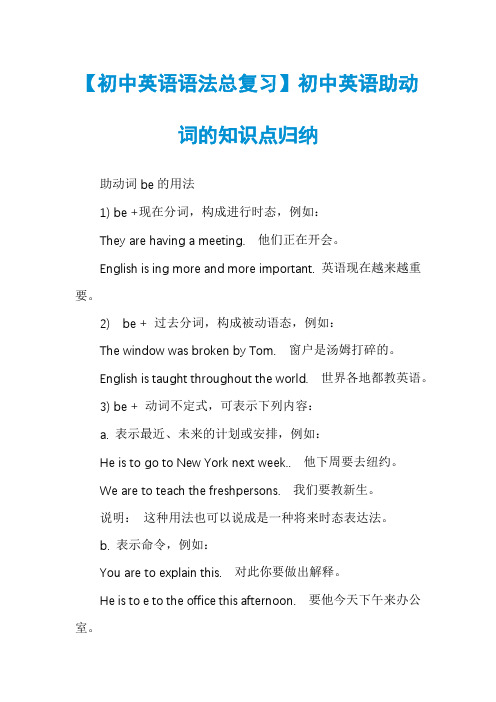
【初中英语语法总复习】初中英语助动词的知识点归纳助动词be的用法1) be +现在分词,构成进行时态,例如:They are having a meeting.他们正在开会。
English is ing more and more important. 英语现在越来越重要。
2)be + 过去分词,构成被动语态,例如:The window was broken by Tom.窗户是汤姆打碎的。
English is taught throughout the world.世界各地都教英语。
3) be + 动词不定式,可表示下列内容:a. 表示最近、未来的计划或安排,例如:He is to go to New York next week..他下周要去纽约。
We are to teach the freshpersons.我们要教新生。
说明:这种用法也可以说成是一种将来时态表达法。
b. 表示命令,例如:You are to explain this.对此你要做出解释。
He is to e to the office this afternoon.要他今天下午来办公室。
c.征求意见,例如:How am I to answer him?我该怎样答复他?Who is to go there?谁该去那儿呢?d. 表示相约、商定,例如:We are to meet at the school gate at seven tomorrow morning.我们明天早晨7点在校门口集合。
助动词have的用法1)have +过去分词,构成完成时态,例如:He has left for London.他已去了伦敦。
By the end of last month, they had finished half of their work.上月未为止,他们已经完成工作的一半。
2)have + been +现在分词,构成完成进行时,例如:I have been studying English for ten years.我一直在学英语,已达十年之久。
初中英语语法:动词和动词短语(中考总复习)

四 “看”
强调精力比较集中地看,常用于看电视、体育活动 watch 或比赛 look 强调动作,即“看”,后接宾语时要加at
see 强调结果,即“看见,看到”
read 强调阅读,常指看书/报纸/杂志等
专题八 动词和动词短语
返回目录
bring 带来,拿来。强调从别处带到离说话人近的地方
让 学
take 拿去,带走。强调从说话处带到离说话人远的地方 四“拿”
B. hear
C. know
D. tell
试
8. Miss Yang usually sets out early in order to ________ the morning rush hour.
A. choose
B. cause
C. avoid
D. accept
练
9. It sounds like a good plan, but you should________it with your parents first.
1.先判定空格处是否填动词。
习
动词是用来描述主语的动作行为或状态的词,在句子
成
为
中作谓语,是句子不可缺少的部分,用来说明主语是什么、
一 种
处于什么状态或做什么。如果句中没有谓语,则可判定此处
习
应填动词。
惯
注意:有些词具备动词和名词双词性,考生需特别记忆。
专题八 动词和动词短语
返回目录
2.再确定是否需要变形。
A. compare B. complain C. receive
D. consider
7. Time will ________ whether you made the right choice or not. Hold on to it, and you
初中英语语法总复习[1]
![初中英语语法总复习[1]](https://img.taocdn.com/s3/m/c906a710eff9aef8941e0642.png)
初中语法复习Ⅰ词类。
名词:专有名词:表示人名、月份、日期、地名等。
如China, John, London, the USA, Harbin .个体名词:表示单个的人或事物。
如boat, chair, desk, apple .集体名词:表示一群人或一些事物的总称。
如family, people, class, police . 可数名词普通名词物质名词:表示无法分为个体的物质。
如water, air, tea, sea, money, cotton .抽象名词:表示抽象概念的词。
如health, help, work, friendship . 不可数名词2.名词的数。
可数名词有单复数,不可数名词没有单复数。
3.名词的格:名词有三个格:主格(作主语)、宾格(作宾语)、和所有格。
其中只有名词的所有格有形式变化。
(二)冠词1.定冠词-the .○1特指某(些)人或某(些)事物。
The students are very good.○2说话人与听话人都知道的人或事物。
Where is the toilet ?○3重复提到上文的人或事物。
I have a cat , the cat is white and black .○4表示世界上独一无二的事物。
The moon moves around the earth .○5形容词最高级和序数词前和表示方位的名词前。
I am the oldest . He is the first to school . I live in the south .○6乐器的名称前常用定冠词-the 。
I like playing the piano / violin .○7和某些形容词连用,使形容词名词化,代表某一类人。
We should help the poor .○8放在某些专有名词前。
We will go to visit the Great Wall next week . the people’s Republic of China .○9放在姓氏的复数形式前,表示全家人或夫妇两人。
【初中英语】初中英语语法总结 期末总复习必看

【初中英语】初中英语语法总结期末总复习必看期末必考初中重点英语语法知识点九种基本时态一、一般现在时概念:表示经常发生的动作或经常存在的状态。
常和 always , often , usually , sometimes , every day 等表时间的状语连用。
如:1) I go to school every day . 我每天都去学校。
(表经常)2) He is always like that . 他总是那样。
(表状态)二、一般过去时概念:1) 表示过去某个时间发生的动作或存在的状态。
常和表示过去的时间状语连用。
如:yesterday , last week , in 1998 , two days ago等。
如:I went to a movie yesterday. 我昨天去看了一场电影。
2) 也可表示过去经常或反复发生的动作。
如: He always went to work by bike last week.三、现在进行时概念:表示现在(说话瞬间)正在进行或发生的动作。
如:He is singing.They arewatching TV now.构成:主语 + 助动词be(am/are/is) + 动词-ing形式构成.四、过去进行时概念:表示过去某一时刻或某一段时间正在进行的动作。
这一特定的过去时间除了有上下文暗示外,一般用时间状语来表示。
如:1) ---What were you doing?---I was jumping.2) ---What was the boy doing when the UFO arrived?---He was sleeping.构成:主语 + 助动词be(was/were) + 动词-ing形式构成.五、一般将来时概念:表示现在(说话瞬间)正在进行或发生的动作。
如:He is singing.They are watching TV now.构成:主语 + 助动词be(am/are/is) + 动词-ing形式构成.六、过去将来时概念:表示在过去将来的某一时间发生的动作或存在的状态。
初中英语语法复习:介词(中考总复习)
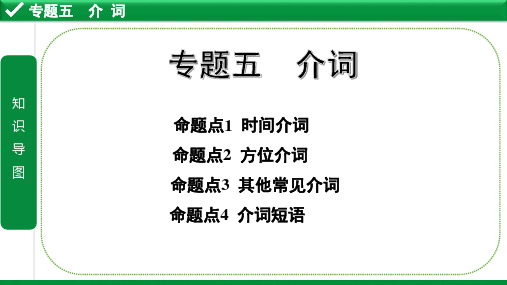
。
专题五 介 词
返回目录
介词
含义及用法
例句
表示“在……正下方” My cat is lying under the chair. 我的猫
under
方
,两者不接触。
正躺在椅子下面。
位
表示“在……的上方”
介
The plane is flying above the clouds. above ,两者不接触,不一
真
在……里面 对于;因为 在……之后 通过;穿过
题
返回答案页
专题五 介 词
安ቤተ መጻሕፍቲ ባይዱ
3.(2012年36题)Welcome to our hotel! I hope you’ll have a
徽
good time ____B___ your stay here.
10
A. after
B. during
C. with
3. in front of与in the front of
介词短语
用法
例句
方
There is a tree in front of the
强调在某一物体外部
位
in front of
classroom.教室(外)的前面有一
的前面。
介
棵树。
词
强调在某一物体内部 in the front of
的前面。
There is a blackboard in the front of the classroom.教室(内) 的前面有一块黑板。
表示最迟在某一时刻或某一 by next Monday下周一之前
by 日期之前。
初中英语语法总复习

初中英语语法总复习初中英语语法总复习初中英语语法是学习英语的重点和难点,从词法到句法共有许多规则需要掌握和应用。
在初中阶段,学生需要掌握大量的语法知识,并且将其应用于日常交流和写作中。
本文将从名词、动词、形容词、副词、介词、代词和从句七个方面进行总复习。
名词名词是指人、物、地点、时间等的名称,可分为可数和不可数两种。
可数名词有单数和复数两种形式,复数的变化规则是在词尾加-s或-es,但是也有特殊变化的名词,如woman-women、man-men等。
不可数名词表示不能分成单独的单位,如水、空气、糖等。
名词有所有格和复合形式,所有格的表示方式是在名词后加-apostrophe+s,复合形式的表示方式是通过多个名词的组合来表示。
还有专有名词和集合名词等,需要注意其用法。
动词动词是指表示动作、状态或存在的词汇,包括不规则动词和规则动词,不规则动词变化规则不规则,而规则动词的变化方式是在词尾加-ed或-d。
动词可分为及物动词和不及物动词,及物动词需要加宾语来表示完整意义,而不及物动词不需要加宾语。
动词还有进行时、完成时、时态、语态等不同的形式,需要根据语境来确定。
形容词形容词是指修饰名词或代词的词汇,用来说明人和物的性质和特征。
形容词分为定语和表语两种,定语是位于名词前的形容词,而表语是位于系动词之后的形容词。
形容词还分为原级、比较级和最高级三种,用来表示不同级别的程度差异。
副词副词是指修饰动词、形容词、副词或整个句子的词汇,用来说明动作或状态的程度、时间、方式等。
副词有时间副词、地点副词、方式副词、程度副词等不同类型,需要根据语境来确定。
副词还有比较级和最高级两种形式,用来表达不同程度的差异,与形容词比较级和最高级的用法相同。
介词介词是指用于连接词语的小词汇,用于表示时间、地点、原因、目的、方式等信息。
常见介词有in、on、at、by、with 等,具有固定的用法和搭配。
介词后需要跟名词或代词,形成介词短语。
- 1、下载文档前请自行甄别文档内容的完整性,平台不提供额外的编辑、内容补充、找答案等附加服务。
- 2、"仅部分预览"的文档,不可在线预览部分如存在完整性等问题,可反馈申请退款(可完整预览的文档不适用该条件!)。
- 3、如文档侵犯您的权益,请联系客服反馈,我们会尽快为您处理(人工客服工作时间:9:00-18:30)。
初中语法复习Ⅰ词类。
(一)名词:专有名词:表示人名、月份、日期、地名等。
如China, John, London, the USA, Harbin .个体名词:表示单个的人或事物。
如boat, chair, desk, apple .集体名词:表示一群人或一些事物的总称。
如family, people, class, police . 可数名词普通名词物质名词:表示无法分为个体的物质。
如water, air, tea, sea, money, cotton .抽象名词:表示抽象概念的词。
如health, help, work, friendship . 不可数名词2.名词的数。
可数名词有单复数,不可数名词没有单复数。
3.名词的格:名词有三个格:主格(作主语)、宾格(作宾语)、和所有格。
其中只有名词的所有格有形式变化。
(二)冠词1.定冠词-the .○1特指某(些)人或某(些)事物。
The students are very good.○2说话人与听话人都知道的人或事物。
Where is the toilet ?○3重复提到上文的人或事物。
I have a cat , the cat is white and black .○4表示世界上独一无二的事物。
The moon moves around the earth .○5形容词最高级和序数词前和表示方位的名词前。
I am the oldest . He is the first to school . I live in the south .○6乐器的名称前常用定冠词-the 。
I like playing the piano / violin .○7和某些形容词连用,使形容词名词化,代表某一类人。
We should help the poor .○8放在某些专有名词前。
We will go to visit the Great Wall next week . the people’s Republic of China .○9放在姓氏的复数形式前,表示全家人或夫妇两人。
The Whites are watching TV .○10固定词组中。
In the morning / afternoon / evening .2.不定冠词-a / an .○1指人或事物的某一种类。
A horse is a useful animal. A table has four legs.○2指某一类人或事物中的任何一个。
Pass me a pencil, please. We write with a pen.○3指某人或某物,但不具体说明何人或何物。
The book was written by a peasant. Last month we were working in a factory.○4不定冠词还可以指“事物的单位”,如“每日”、“每斤”等。
Here is a letter for you . The meat is 18 yuan a kilo.3.零冠词。
○1泛指人类或男女。
Man will conquer nature .○2抽象名词在用来表示它的一般概念时,通常不加冠词。
Knowledge begins with practice .○3有些个体名词有时可以转化成具有抽象意义,其前面也常不加冠词。
We had better send him to hospital at once.○4在专有名词前一般不用冠词。
China is a great country. Mr Smith is an artist.○5在三餐饭何球类运动名称之前不用冠词。
He often goes out for a walk after supper. Sometimes I play basketball.○6在节假日、星期几、月份、季节等名词前。
October 10th is Teachers’Day.○7称呼语或表示头衔、职务的名词前不用冠词。
Granny is sleeping now. We call him monitor.○8在语言名词前,名词前有指示代词、物主代词或数词时,不用冠词。
This is his book. I can speak English .○9不用冠词的惯用语。
At night / on food / go to town / at home / in class / at work 等。
(三)形容词1.形容词的构成。
○1简单形容词由一个单词构成。
Good, long, green, large, bright, interesting, surprised, learned, developing, sleeping .○2复合形容词由一个以上的词构成。
20-minute, second-hand, 500-word, 8-year-old, three-legged, round-trip, part-time, good-looking.2.形容词的用法。
○1修饰名词作定语。
She is a beautiful girl .○2作表语。
He is very strong.○3作宾语补足语。
Let the door open. You must keep your classroom clean .○4“定冠词+形容词”表示一类人或物,在句子中可作主语或宾语。
We should speak to the old politely.○5大多数形容词既可作表语又可作定语,但少数形容词只能作表语,不能作定语。
如:asleep, ill, awake 等。
○6有些形容词只能作定语而不能作表语。
如:many, little, wooden, golden 等。
3.形容词的位置。
○1形容词通常放在它所修饰的名词的前面。
A heavy box.○2与表示度量的词连用,形容词要放在它所修饰词语的后面。
3 metre long. 12 kilometer away .○3与不定代词something, anything, everything, nothing 等连用时,可以放在这些词之后。
Something important . nothing serious .○4当名词前有多个形容词修饰时,一般按下面的词序排列:冠词(包括物主代词、序数词、基数词)-描述形容词(brave, beautiful)-表示形状(大小、长短、高矮)的形容词-表示年龄或新旧的形容词-表示颜色的形容词-表示国籍、出处或来源的形容词-表示材料、物质的形容词-表示用途或类别的形容词-被修饰的词。
My nice small brown leather bag .those large round black wooden tables .4.形容词的比较级和最高级。
(一般加er / est ,不规则见表)○1原级的用法:“……和……相同”A.肯定句:A +动词+as +形容词原级+as +B . He is as tall as me .B.否定句:A…+not as +形容词原级+as +B (即A 不如B 那么…)A…+not so +形容词原级+as +B = A…+ less + 形容词原级+than + B .○2比较级的用法:A.A +动词+形容词的比较级+than +B . (A 比B 更…,在这种句型中,比较级前面可用much, even, still,a little, a bit, a lot, any, far 等修饰,表示“…得多”,“甚至…”,“更…”,“…一点儿”。
B.“比较级+and +比较级”、“more and more +部分双音节或多音节的原级”译为“越来越…”。
○3最高级的用法:(个体用-of ,围用-in,最高级前面要用定冠词-the)A.三种最高级表示法。
最高级:Shanghai is the largest city in China .比较级:Shanghai is larger than any other city in China . / Shanghai is larger than the other cities in China .原级:No other city is as large as Shanghai in China . / No other city is larger than Shanghai in China . (四)副词1.副词的种类:○1时间副词:often, always, usually, early, ago, already, before, ever, late, now, soon, since, tomorrow, just now …○2地点副词:here, there, above, below, outside, anywhere, back, down, home, out, everywhere …○3方式副词:hard, well, badly, fast, slowly, angrily, simply, carefully …○4程度副词:very, quite, much, still, almost, little, too, enough …○5疑问副词:how, when, where, why …○6关系副词:when, where, why …(引导定语从句)○7连接副词:how, when, where, why, whether …○8频率副词:often, seldom, usually, never, sometimes, every day, always, hardly …○9其他副词:really, certainly, surely, maybe …2.副词的用法:○1作状语:He can finish the work easily .○2作定语(要后置):The students here are from Harbin .○3作表语:I must be off now .○4作宾补,构成复合宾语:Show him up . I saw him out with my sister last night . 3.副词的比较级和最高级。
(一般加er / est ,不规则见表)○1副词的原级:A.as + 副词的原级+ as “与…一样”B.not as(so) + 副词的原级+ as “与…不一样”C.too + 副词的原级+ to do sth . “太…而不能”D.so + 副词的原级+ that 从句“如此…以致于…”E.副词的原级+ enough to do sth . “足够…能做…”○2副词的比较级:A.A + 动词+ 副词比较级+ than + BB.副词比较级前也可以用much, even, still, far, any, a little, a bit, a lot 等修饰。
